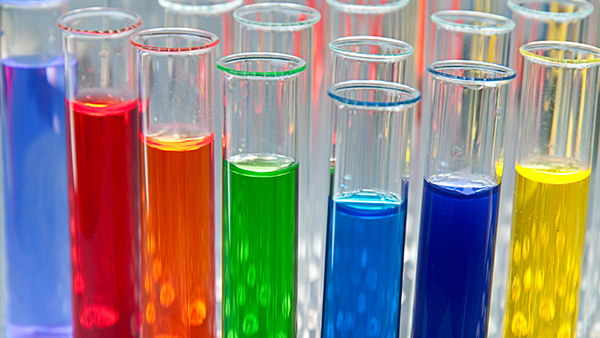April 5, 2023
A Master of Chemistry degree to fit your life
St. Scholastica’s online Master of Science in Chemistry gives industry professionals and teachers a way to advance wherever they are, whenever they are.
Denae O’Neil, a high school science and engineering teacher in the remote Rocky Mountains, always wanted to pursue a master’s degree but couldn’t find the time while raising children and working. When her kids got old enough, she saw the timing was right.
The challenge was to find an academically rigorous, online master’s degree in chemistry program.
Fortunately, The College of St. Scholastica offers just that. The MS in Chemistry is designed for educators and industry professionals looking for professional development that’s challenging, yet flexible enough to complement their lives of work and family.
Asynchronous online classes are taught by experienced faculty in an accelerated 8-week term. Students take ten classes total, 1-2 classes at a time, with four required core classes and six electives to best suit their interests. They choose the order in which they take the courses, and can take off a term if needed. The program does not require a thesis, final exam or GRE. It’s meant to be completed in 1-2 years.
Rigorous program with a personal focus
Among the small handful of options nationwide, Denae chose St. Scholastica for its small, private liberal arts focus. “They returned my phone calls, and they responded to my emails right away. I am just at heart a fan of smaller, liberal arts schools.”
Benjamin Pinkley chose the program because he, too, favored the personal, liberal arts approach. He had worked for almost five years as an analytical chemist in Louisville, KY, when he decided to pursue more professional development.
He found the program gives him a firmer grasp for what he does daily. “Undergrad gave me the tools I needed. Graduate school shows me how to better use those tools.”
The flexibility, plus advanced instruction, accounts for why the program attracts students from 20 different states, says Program Director Melanie L. Talaga, PhD. “We have a faculty member in each discipline, so we support all chemistry disciplines, to allow students to create a master’s degree with electives they’re interested in.”
Immediate on-the-job application
As program director, Dr. Talaga teaches and enjoys meeting one-on-one with current and prospective students. “Students have Zoomed with me for help with a research problem right there at the job,” she said, noting one instance where a student at a pharmaceutical company sought her expertise troubleshooting an assay that wasn’t working — right there on the job. “The professional network of professors gives students a much broader group of experts to tap into,” she said.
Ben also finds the courses positively influence his daily work. “My course on advanced analytical instrumentation directly applied to my work as an analytical instrumentalist. Really, it inundates my whole thought process — I can think through the science of what’s before me rather than following a standard operating procedure.”
Being in an academic program has reinvigorated his passion for what he does. “Industry is how science actually applies to the world in an immediate way. You might come up with a best possible application for a phenomenon, but it’s not practical, it’s not economic, so it’s left by the wayside. In academia you don’t have to leave behind what fascinates you — you can delve deeper.”
“The professors teach in extremely unique methods,” said Denae. “As a teacher, I’ve appreciated it because I’ve seen them model how to teach really challenging content in nontraditional ways. It has enhanced my own teaching.”
Flexible for real life
Both Denae and Ben appreciate being able to focus on just one course at a time, and choose the course to best fit other life demands. Ben decided to take off a term that was busy with travel. They also agree that the best rhythm is working a couple hours each day, with some longer time on weekends, for an average of about 15 hours per week.
“Because it’s been 30-some years since I was in college, I definitely had to be patient and give myself extra time to catch up on subjects like calculus,” said Denae. “I’m surprised how quickly some of the things came back.”
Dr. Talaga credits the nontraditional, online format as a key strength. “We’re allowing students to come back who didn’t think this was possible.”
To learn more about whether the St. Scholastica MS in Chemistry program is right for you, contact Joe Rembowicz at jrembowicz@css.edu.


